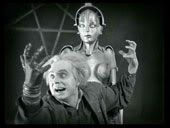
German director Fritz Lang's "masterpiece" (as its hailed by film scholars and writers alike, rightfully so) is such an artifact that its original print is long gone, but thankfully a close representation of that print has been pieced together for DVD through negatives and other crafty means. For instance, scenes lost from the original print are explained in on-screen text, often times four individual paragraphs in a row for extended chunks of missing reel. This doesn't hurt the experience, fortunately. What Lang captured was so massive that, no matter what year or under what context the film is seen, Metropolis feels like a big budget spectacle. Realize that this was conceived in 1927, though, and it's downright mindblowing. The explosions are all convincing, the finale's huge flash flood that engulfs hundreds of acting extras is flawless, and the pre-Frankenstein laboratory lightshow scenes are visually extraordinary.
Even the plot is ahead of it's then-time. Set in the year 2026, the film takes places in Metropolis, a progressive fictional city run by Joh Frederson, a wealthy leader who operates with subdued coldness rather than any unhinged tyranny. Frederson has divided the city into two factions: the slave-like workers who are forced to live underground and the upper class that gets to enjoy the fruits of Metropolis' utopian-like landscape. His son, Freder, wants to unite the two groups, though, and decides to live amongst the lowly workers. But when a revolt begins brewing within the workers' society, Frederson and a mad scientist named Rotwang intervene in pretty wild sci-fi ways. Metropolis: Rise Against the Machines would've been a fitting longer title.
Metropolis is also a haunting beast to sit with, due in no small part to its black-and-white, silent film aesthetic. Call me a bit soft, but silent films tend to creep me out more so than loud fare. No film has given me more nightmares than the FW Murnau/Max Schrek paralyzer Nosferatu (1922), and not many horror flicks can rip into the depths of my skin like Carl Dreyer's expressionist creepshow Vampyr (1932). Metropolis isn't scary in the same sense of those silent films, but Lang's movie features several images that are tough to forget. There's a Grim Reaper figure that stands alongside a lineup of minions that came out of nowhere and took Metropolis into an unexpected, momentary supernatural zone. The vacant black eyes of the cast, paired with the exaggerated acting needed to convey emotions in silent films, give the film an otherworldly quality inherent to unease, a trait used to perfection in a shot that fills the entire screen with floating, peeled-open-in-amazement eyeballs.
The lab scene (though with different music; this isn't the score heard in Lang's film):

Metropolis is two hours long (including an "Intermezzo," or intermission), but it doesn't feel that long. I'll admit, the two-hour-length was intitially intimidating. I wasn't sure if I'd be able to make it through a silent film of such length, only because it's been a long-ass time since I've watched a silent. In no way was I expecting the film to be as convincingly brolic in scope as it is, though, so its runtime became frivolous once the show got on the road.
It may have taken me much longer than it should have to sit down with Metropolis, free of distraction, but since when is lateness irreconcilable? Besides, I'll have plenty of time to catch up now that I'm unable to shake the film out of my brain.




No comments:
Post a Comment